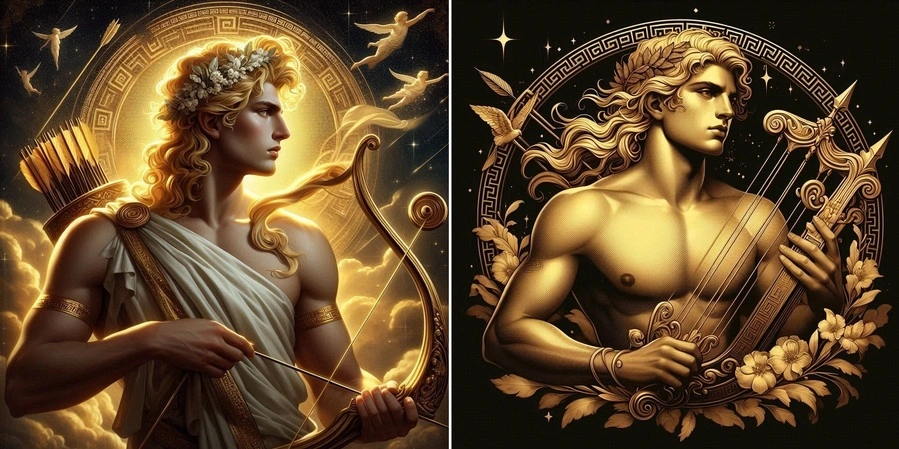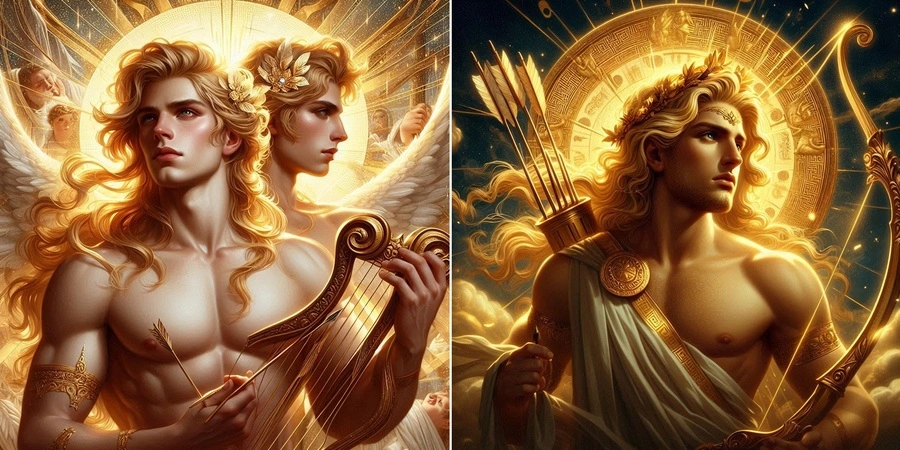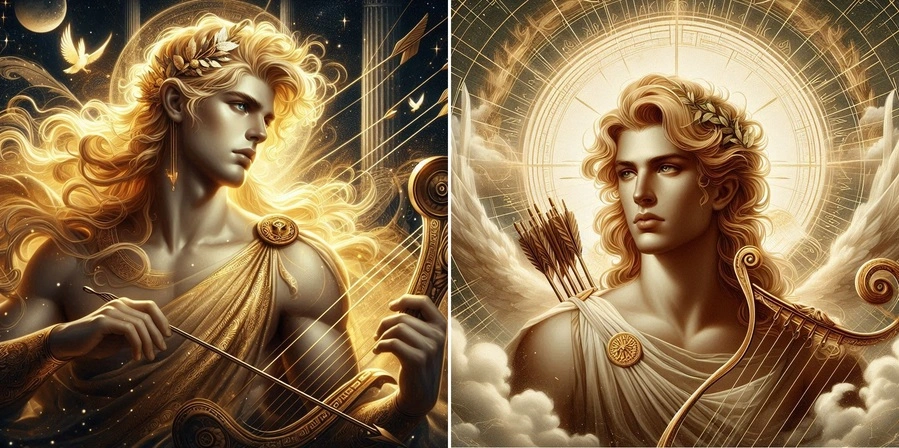
Apollo, the Greek god of light, music, poetry, and prophecy, was one of the most important and widely worshipped deities in ancient Greece. Apollo was one of the twelve Olympian gods.
Apollo stands out as a beacon of brilliance, not just figuratively, but literally. He wasn’t just the god of light; his domain encompassed a multitude of aspects that, like sunlight filtering through a prism, revealed the multifaceted nature of civilization itself.
Who was Apollo?
Apollo, son of Zeus and Leto, was born on the island of Delos, alongside his twin sister, Artemis. His birth was fraught with challenges, as Hera, Zeus’s wife, sought to prevent Leto from finding a place to give birth. This struggle highlights Apollo’s divine significance even before he entered the world. Upon his birth, the island of Delos was said to have blossomed, symbolizing his connection to life and beauty.
Apollo was often depicted as a strikingly handsome youth with a radiant aura, embodying the quintessential Greek ideal of physical perfection. He was associated with the sun, often linked with Helios, the sun god, although they were distinct entities in mythological tradition. This association with light extended to his role as a purifier and protector against evil forces, symbolizing clarity, truth, and enlightenment.
The Story of Apollo
One of the most captivating myths involving Apollo is his confrontation with the fearsome serpent Python, a creature that brought dread to the inhabitants of Delphi. In a dramatic display of his prowess, Apollo vanquished Python with his unerring arrows, an act that not only freed the people from their tormentor but also established him as the preeminent deity of prophecy. This victory solidified Delphi’s status as a sacred site dedicated to Apollo, where seekers from across the ancient world would come to receive divine wisdom.
Apollo’s life was also marked by numerous romantic entanglements with both deities and mortals, reflecting the complexities of divine love in Greek mythology. One of the most poignant tales is his pursuit of Daphne, a beautiful nymph who fervently wished to escape his ardent pursuit. In her desperation, Daphne prayed to her father, the river god Peneus, for salvation. Answering her plea, Peneus transformed Daphne into a laurel tree just as Apollo was about to capture her. Stricken with grief yet moved by her beauty, Apollo declared the laurel tree sacred, forevermore adorning himself with its leaves as a symbol of his undying love and sorrow.

These stories highlight the multifaceted nature of Apollo, encompassing not only his formidable strength and prophetic powers but also his deep emotional capacity. The myth of Python underscores his role as a protector and purifier, essential traits that cemented his reverence in Greek culture. The tale of Daphne, on the other hand, reveals a softer, more personal side of Apollo, illustrating the poignant complexities of divine passion and loss.
In addition to these well-known myths, Apollo’s romantic ventures included numerous other figures from both the mortal and divine realms. For instance, his affection for the mortal princess Coronis resulted in the birth of Asclepius, who would grow to become the god of medicine. However, their relationship ended tragically when Coronis was unfaithful, leading to her demise at Apollo’s hands, yet he saved their unborn child, highlighting his conflicting roles as both a lover and a judge.
Another notable story is his relationship with Hyacinthus, a Spartan prince of great beauty. Their bond was strong, but it ended in tragedy when Zephyrus, the god of the west wind who was also in love with Hyacinthus, caused a fatal accident out of jealousy. Apollo, devastated by the loss, transformed Hyacinthus’s spilled blood into the hyacinth flower, ensuring his beloved’s memory would endure eternally.
These narratives collectively portray Apollo not just as a powerful deity but as a figure deeply intertwined with themes of love, loss, and transformation. His interactions with various figures reflect the ancient Greeks’ understanding of the gods as beings capable of profound emotions and intricate relationships, mirroring human experiences on a divine scale.

Apollo’s associations with music and the arts further enrich his mythological profile. His contests with other gods and mortals over musical prowess, such as the competition with the satyr Marsyas, who dared challenge Apollo to a musical duel, showcase his supreme skill and the dire consequences of hubris. Marsyas’s defeat and subsequent punishment underscore Apollo’s authority in the arts and the dangers of overstepping one’s bounds in the face of divine talent.
Apollo’s Family
Apollo had several brothers and sisters in Greek mythology, including Artemis, the goddess of the hunt and the moon, and Hermes, the god of commerce and thieves. He was also the brother of the goddess of the hearth, Hestia, and the goddess of wisdom, Athena. His other siblings were Ares, the god of war, Dionysus, the god of wine and fertility, and Hephaestus, the god of fire and metalworking.
Apollo had several children in Greek mythology, including Asclepius, the god of medicine and healing, and Orpheus, a musician and poet known for his tragic story. He was also the father of the Muses, the nine goddesses who inspired creativity and the arts. According to mythology, the Muses were born from Apollo and Mnemosyne, the goddess of memory. Apollo was also the father of Troilus, a prince of Troy who was killed during the Trojan War.
The Symbols of Apollo
The Lyre
One of the most common symbols associated with Apollo is the lyre, a stringed instrument that Apollo was said to have invented. The lyre was often depicted in artwork and literature related to Apollo, emphasizing his role as the god of music and poetry.
The Sun
Another symbol associated with Apollo is the sun. In ancient Greek culture, the sun was often associated with light, clarity, and knowledge, all qualities that were attributed to Apollo as the god of light and enlightenment.
The Bow and Arrow
The bow and arrow were another symbol associated with Apollo. In some myths, Apollo was said to have used his bow and arrows to bring about sickness and disease, emphasizing his role as the god of healing and medicine.
The Laurel Wreath
The laurel wreath was a symbol associated with Apollo as the god of music and poetry. In ancient Greece, laurel leaves were often used to make wreaths for poets and musicians, emphasizing their artistic achievements and the divine inspiration behind their work.
The Dolphin
The dolphin was another symbol associated with Apollo. In some myths, Apollo was said to have transformed into a dolphin, using his powers of transformation to escape from danger or to assist sailors in peril.
The Colors Gold and Silver
In artwork and literature related to Apollo, the colors gold and silver were often used to represent the god of light and music. These colors were associated with wealth, purity, and brilliance, emphasizing Apollo’s role as a powerful and radiant deity.
10 Myths and Facts about Apollo
- Apollo was the son of Zeus and Leto, a Titaness, and had a twin sister named Artemis.
- Apollo was known for his musical abilities, and was often depicted playing the lyre or singing.
- Apollo was also known for his ability to prophesize the future, and had an oracle at Delphi where people would come to seek his guidance.
- One of the most famous myths surrounding Apollo is his role in the Trojan War, where he sides with the Trojans and helps them to defeat the Greeks.
- Apollo was often depicted as a handsome and youthful god, with long golden hair and a bow and arrows.
- Apollo was also associated with healing, and was often called upon to cure illnesses and diseases.
- Apollo was a patron of the arts, and was believed to have inspired many poets and musicians throughout history.
- Apollo was worshipped throughout the ancient world, and his cult was particularly popular in Greece, Rome, and Egypt.
- Apollo was also associated with the sun, and was sometimes referred to as the “sun god.”
- Apollo’s most famous temple was the Temple of Apollo at Delphi, which was considered one of the most important religious sites in the ancient world.
Though Helios was the original sun god, Apollo’s epithet, Phoebus (“bright” or “pure”), eventually led to him becoming identified with the celestial chariot that pulled the sun across the sky, bathing the world in warmth and light. He symbolized the order and rationality that daylight brought, dispelling the chaos and uncertainty of night.
Apollo wasn’t just the god of light; he was also the god of knowledge and prophecy. His most famous oracle was at Delphi, where the priestess Pythia, believed to be possessed by Apollo, would utter cryptic pronouncements that mortals interpreted to understand the will of the gods. These prophecies, though veiled in metaphor, guided rulers and individuals alike, shedding light on the path ahead.
Apollo’s association with light extended to healing. As Asclepius, his son, is often considered the true god of medicine, Apollo represented a more preventative form of health. He was believed to ward off plagues and illnesses, the darkness that threatened the well-being of humanity. Ironically, he could also inflict plagues as punishment, a reminder of the delicate balance between light and shadow.
Frequently Asked Questions
Who is Apollo married to?
Apollo, the Greek god of light, prophecy, music, and healing, is not married. Unlike many other gods in Greek mythology, Apollo does not have a consort or spouse. Instead, his myths are filled with numerous love affairs and romantic pursuits, both successful and tragic, involving various gods, mortals, and nymphs.
What were Apollo’s Greek god powers?
Apollo’s powers were as multifaceted as his domains. Here’s a glimpse:
- Solar Brilliance: He could control the sun’s light and heat, dispelling darkness and bringing warmth.
- Musical Mastery: As the leader of the Muses, he possessed unmatched musical talent, wielding the power of music to soothe and inspire.
- Prophetic Knowledge: Through oracles like Delphi, he could channel cryptic pronouncements that shed light on the future.
- Healing Touch: He could ward off plagues and illnesses, representing a preventative form of health.
- Awe-Inspiring Archery: With his divinely forged arrows, he was a formidable archer, capable of great precision and lethal force (as seen in his battle with Python).
- Moral Compass: He embodied ideals like truth, justice, and moderation, guiding humanity towards a civilized path.
Where can you find Apollo, the Greek god?
In Greek mythology, Apollo resides on Mount Olympus, the home of the gods. He frequently travels to various sacred sites associated with his worship. Some of the most significant places where you can find references to Apollo include:
- Delphi: One of the most important and sacred sites dedicated to Apollo is the Oracle of Delphi, where he was believed to provide prophetic insights through the Pythia, his high priestess.
- Delos: The island of Delos is the birthplace of Apollo and his twin sister, Artemis. It was an important religious center and hosted various festivals in their honor.
- Mount Olympus: As one of the Olympian gods, Apollo resides on Mount Olympus, where he lives among the other major deities in Greek mythology.
- Various Temples: Temples dedicated to Apollo were built throughout the ancient Greek world. Some notable examples include the Temple of Apollo at Didyma, the Temple of Apollo at Bassae, and the Temple of Apollo Patroos in Athens.
Comments
Leave a Reply
You must be logged in to post a comment.
I really like Apollo.